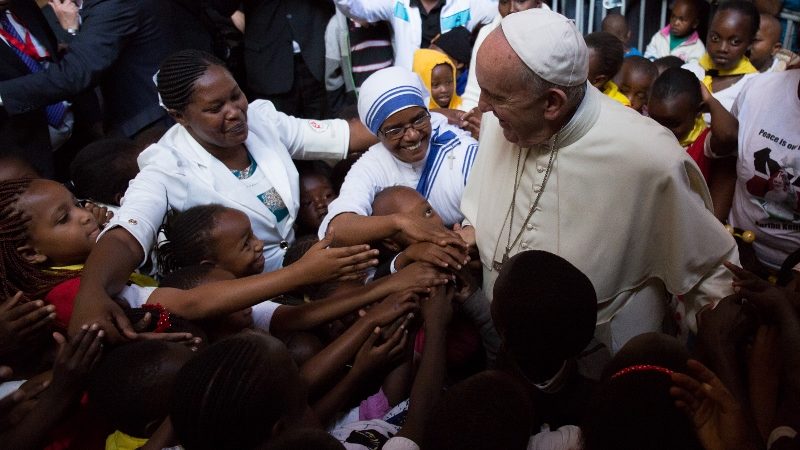Love beyond boundaries and borders: A reflection on Fratelli Tutti

On 4 October last year, the Vatican released Pope Francis’ newest encyclical, Fratelli Tutti. CAFOD’s Head of Theology, Linda Jones, shares her reflections on this much anticipated work.
At the heart of Pope Francis’ new encyclical, Fratelli Tutti, is a call to love. The Pope invites us to recognise Christ himself “in each of our abandoned or excluded brothers and sisters.’”
This love is not soft and fluffy, but gut-wrenching. It pulls not so much at our heartstrings as at our intestines! We are invited to get close to those who are suffering and allow them to change the way we think and act.
Learn more about the Pope’s latest encyclical
Love is practical
“Will we bend down to touch and heal the wounds of others? Will we bend down and help another to get up? This is today’s challenge, and we should not be afraid to face it,” Pope Francis writes. “Our love for others, for who they are, moves us to seek the best for their lives.”
Pope Francis invites us to meditate on the story of the Good Samaritan. What does the Good Samaritan teach us about love? That love goes beyond boundaries and borders. Expressions of love, such as caring for others, are not just for those already close to us like our family and friends.
St Francis, the Pope says, “calls for a love that transcends the barriers of geography and distance and declares blessed all those who love their brother ‘as much when he is far away from him as when he is with him.’”
Fratelli Tutti: A prayer to the Creator
The universal values of solidarity and fraternity
Pope Francis wrote this letter during the coronavirus pandemic. He says that the pandemic showed us that we can come together as local, national and global communities. But that immediate response soon fragmented. Instead of trying to go back to the old ‘normal,’ he asks us to make sure this is not just another “tragedy from which we learned nothing.”
We get the sense that he feels the world is on the brink, and we need to move away from what was already wrong, stepping forward in a different direction. He says that dark clouds were already on the horizon.
The Pope has seen a rise in “resentful and aggressive nationalism” and a scandalous inequality. He mentions the temptation to build a “culture of walls.” Instead, he proposes a “culture of encounter” that sees other people as gift, not threat.
Taking an active part
Instead of short-term political and economic advantage for a few people, we all have a part to play in working together for the common good. “If only we might rediscover once and for all that we need one another, and that in this way our human family can experience a rebirth, with all its faces, all its hands and all its voices, beyond the walls that we have erected.”
Short-term fixes are not enough. The earth, and the poorest and most vulnerable people, need us to respond urgently. “Each day,” he says, “we have to decide whether to be Good Samaritans or indifferent bystanders.”